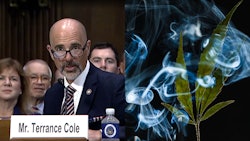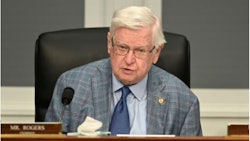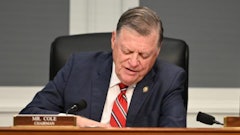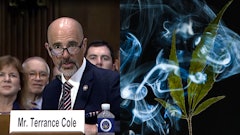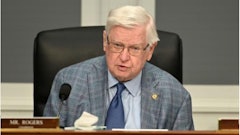
The Drug Enforcement Administration (DEA) judge who was tasked with overseeing a Biden administration proposal to reschedule cannabis is set to retire on Aug. 1.
John J. Mulrooney II, the agency’s chief administrative law judge, notified the hearing’s designated participants on July 23 that he will no longer have jurisdiction over the case come the end of next week.
“My retirement will leave the DEA with no Administrative Law Judge to hear this matter or any of the Agency’s other pending administrative enforcement cases,” Mulrooney wrote. “The Controlled Substances Act requires that DEA administrative enforcement hearing proceedings must be conducted in accordance with the Administrative Procedure Act and presided over by an Administrative Law Judge.”
The current hearing process, to debate the merits of a proposal to reclassify cannabis from a Schedule I to a Schedule III drug under the Controlled Substances Act (CSA), has been stayed since Jan. 13, 2025, when Mulrooney granted an interlocutory appeal amid claims from pro-rescheduling parties that the DEA conducted improper communications with anti-rescheduling participants.
Mulrooney has retained limited jurisdiction over the case during the past six months to provide rulings on non-dispositive, procedural motions, such as certain participants dropping out of the process, and others seeking alternative counsel.
However, during the past six months, the hearing process has remained delayed in the absence of the DEA administrator fixing a briefing schedule to allow for the designated participants to weigh in on the matter, as Mooney ordered.
Derek S. Maltz was the DEA’s acting administrator from Jan. 21 until early May, when he stepped down, and Robert Murphy was the acting administrator until July 21, when the Senate confirmed President Donald Trump's nominee, Terrance Cole, to head the agency.
That said, the fate of the hearing process is now in Cole’s hands.
“Until there is a change in this circumstance, all matters filed in this case will be forwarded to the DEA Administrator, for whatever action, if any, he deems appropriate,” Mulrooney wrote in his retirement announcement July 23. “All previously-issued procedural orders remain in full force and effect unless otherwise modified by a successor Administrative Law Judge, the DEA Administrator, or the Attorney General.”
Cole told U.S. senators during his April confirmation hearing that “it’ll be one of my first priorities” to review where the DEA is in the administrative process to reschedule cannabis upon being confirmed.
However, Cole provided no promises on the Schedule III proposal that was recommended by former President Joe Biden’s U.S. Department of Health and Human Services and published in the Federal Register after former Attorney General Merrick Garland signed off on a notice of proposed rulemaking. Biden’s DEA never backed the proposal.
While Mulrooney is retiring, his vacancy isn’t expected to further delay the cannabis rescheduling hearing process: That ball is currently in Cole’s court.
“Naturally, I wish all the parties the best in resolving this important issue in a fair, transparent, and accurate manner, and extend my heartfelt gratitude to the parties and their representatives for their sincere, diligent, and indefatigable advocacy,” Mulrooney wrote.
Mulrooney called attention to the DEA’s lack of transparency under the Biden administration early on in the hearing process, specifically pointing to former Administrator Anne Milgram’s secretive selection process for the 25 designated participants in October 2024.
It took a lawsuit from a party that was excluded from the process to shed light on the DEA selections. The lawsuit provided a record that the DEA sent “cure letters” to several anti-rescheduling entities, providing them the opportunity to submit supplemental information showing that they met the “interested person” status under the Administrative Procedure Act.
“The government’s failure to acknowledge in any way the gravity of the highest levels of its organization allegedly reaching out to help one of the potential DPs fortify its application to ease the task of justifying its apparently pre-made determination for appeal demonstrates an arrogant overconfidence that may not serve it well in the future,” Mulrooney wrote in his January order granting the interlocutory appeal.












